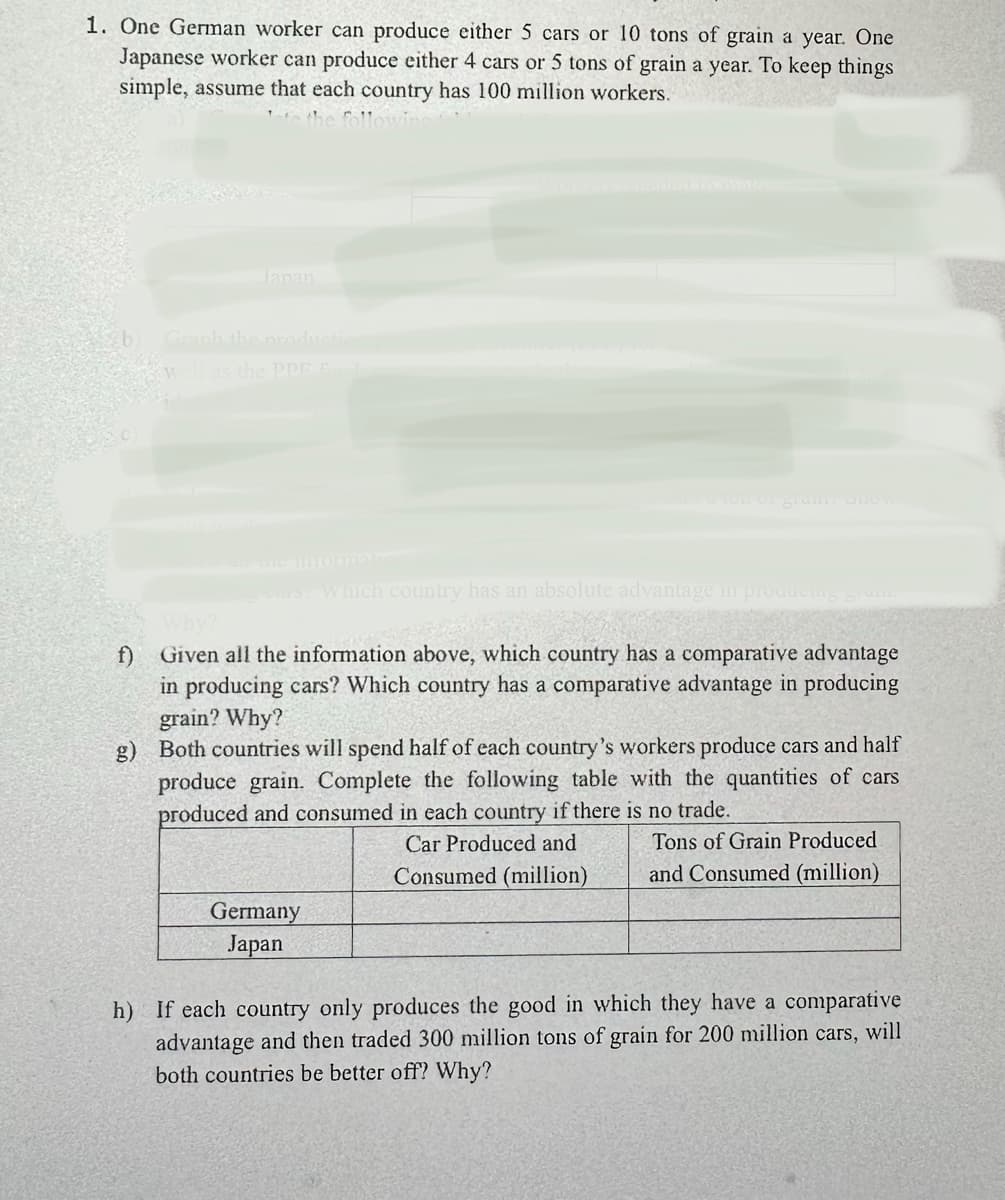1. One German worker can produce either 5 cars or 10 tons of grain a year. One Japanese worker can produce either 4 cars or 5 tons of grain a year. To keep things simple, assume that each country has 100 million workers. Japan cars! Which country has an absolute advantage in f) Given all the information above, which country has a comparative advantage in producing cars? Which country has a comparative advantage in producing grain? Why? g) Both countries will spend half of each country's workers produce cars and half produce grain. Complete the following table with the quantities of cars produced and consumed in each country if there is no trade. Car Produced and Consumed (million) Tons of Grain Produced and Consumed (million) Germany Japan h) If each country only produces the good in which they have a comparative advantage and then traded 300 million tons of grain for 200 million cars, will both countries be better off? Why?
1. One German worker can produce either 5 cars or 10 tons of grain a year. One Japanese worker can produce either 4 cars or 5 tons of grain a year. To keep things simple, assume that each country has 100 million workers. Japan cars! Which country has an absolute advantage in f) Given all the information above, which country has a comparative advantage in producing cars? Which country has a comparative advantage in producing grain? Why? g) Both countries will spend half of each country's workers produce cars and half produce grain. Complete the following table with the quantities of cars produced and consumed in each country if there is no trade. Car Produced and Consumed (million) Tons of Grain Produced and Consumed (million) Germany Japan h) If each country only produces the good in which they have a comparative advantage and then traded 300 million tons of grain for 200 million cars, will both countries be better off? Why?
Principles of Macroeconomics (MindTap Course List)
8th Edition
ISBN:9781305971509
Author:N. Gregory Mankiw
Publisher:N. Gregory Mankiw
Chapter3: Interdependence And The Gains Rrom Trade
Section: Chapter Questions
Problem 5PA
Related questions
Question

Transcribed Image Text:1. One German worker can produce either 5 cars or 10 tons of grain a year. One
Japanese worker can produce either 4 cars or 5 tons of grain a year. To keep things
simple, assume that each country has 100 million workers.
Japan
well as the PPE 6 L
which country has an absolute advantage in produ
f)
Given all the information above, which country has a comparative advantage
in producing cars? Which country has a comparative advantage in producing
grain? Why?
g) Both countries will spend half of each country's workers produce cars and half
produce grain. Complete the following table with the quantities of cars
produced and consumed in each country if there is no trade.
Car Produced and
Consumed (million)
Tons of Grain Produced
and Consumed (million)
Germany
Japan
h) If each country only produces the good in which they have a comparative
advantage and then traded 300 million tons of grain for 200 million cars, will
both countries be better off? Why?
Expert Solution
This question has been solved!
Explore an expertly crafted, step-by-step solution for a thorough understanding of key concepts.
Step by step
Solved in 4 steps with 1 images

Knowledge Booster
Learn more about
Need a deep-dive on the concept behind this application? Look no further. Learn more about this topic, economics and related others by exploring similar questions and additional content below.Recommended textbooks for you

Principles of Macroeconomics (MindTap Course List)
Economics
ISBN:
9781305971509
Author:
N. Gregory Mankiw
Publisher:
Cengage Learning

Principles of Economics, 7th Edition (MindTap Cou…
Economics
ISBN:
9781285165875
Author:
N. Gregory Mankiw
Publisher:
Cengage Learning

Brief Principles of Macroeconomics (MindTap Cours…
Economics
ISBN:
9781337091985
Author:
N. Gregory Mankiw
Publisher:
Cengage Learning

Principles of Macroeconomics (MindTap Course List)
Economics
ISBN:
9781305971509
Author:
N. Gregory Mankiw
Publisher:
Cengage Learning

Principles of Economics, 7th Edition (MindTap Cou…
Economics
ISBN:
9781285165875
Author:
N. Gregory Mankiw
Publisher:
Cengage Learning

Brief Principles of Macroeconomics (MindTap Cours…
Economics
ISBN:
9781337091985
Author:
N. Gregory Mankiw
Publisher:
Cengage Learning

Principles of Macroeconomics (MindTap Course List)
Economics
ISBN:
9781285165912
Author:
N. Gregory Mankiw
Publisher:
Cengage Learning

Essentials of Economics (MindTap Course List)
Economics
ISBN:
9781337091992
Author:
N. Gregory Mankiw
Publisher:
Cengage Learning

Principles of Economics 2e
Economics
ISBN:
9781947172364
Author:
Steven A. Greenlaw; David Shapiro
Publisher:
OpenStax